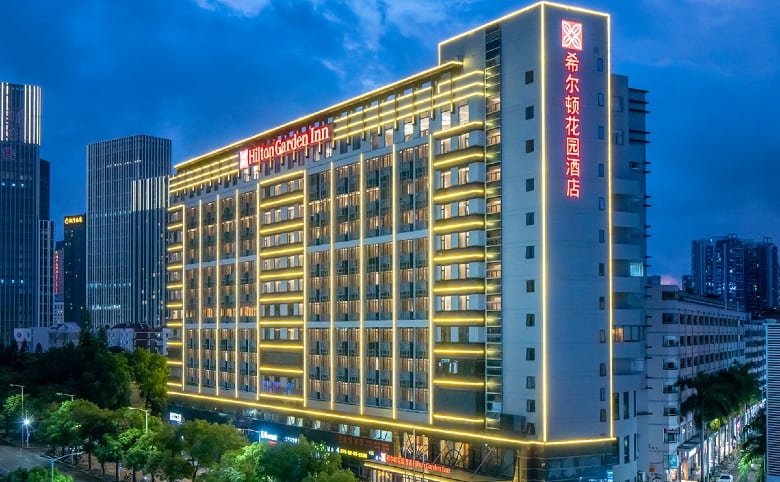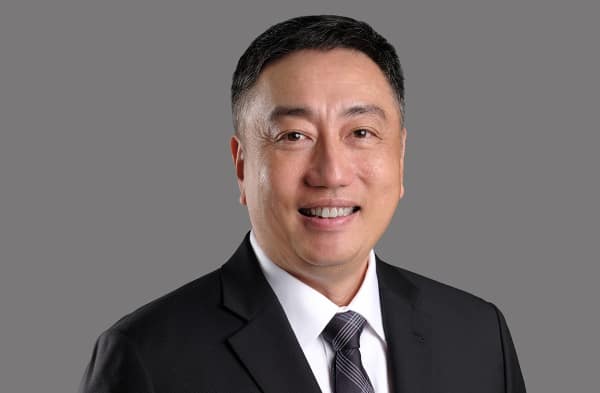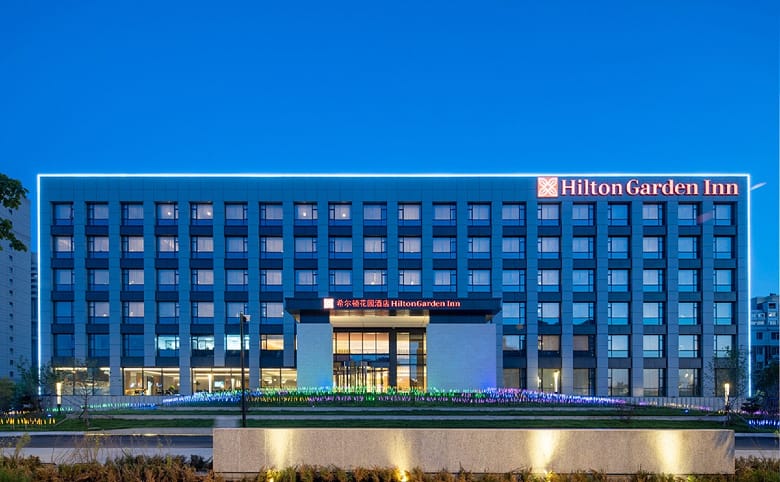
The Hilton Garden Inn Nanshan Avenue in Shenzhen
As Asia Pacific’s hospitality industry struggles to put COVID-19 in the rearview mirror and lure back wary guests, Hilton is trying to get a jump on the market with the launch of a large-scale franchise model in China and a luxury-brand push in key cities around the region.
New York-listed Hilton is betting that independent hotel owners in APAC’s biggest economy will be eager to benefit from the group’s commercial strategies and support network by investing in franchising opportunities with Hilton Garden Inn, an upscale focused-service brand, the company said in a Tuesday press release.
Hilton has signed more than 100 deals to develop Hilton Garden Inn with a specific prototype aimed at catering to the country’s rising middle class. And while the pandemic led to travel restrictions that squeezed occupancy, the company spent the downtime investing in systems, training and processes to support existing owners.
“The launch of the pure-play franchise model and corresponding prototype enables independent owners to leverage the award-winning international brand recognition and build quality of Hilton Garden Inn,” said Clarence Tan, Hilton’s senior vice president for development in Asia Pacific.
Fast-Growing Segment
Speaking with Mingtiandi from Singapore, where the century-old hotel group’s APAC operations are based, Tan said Hilton in Greater China is zeroing in on the focused-service (also called select-service) segment, which typically offers travellers full-service accommodation without some of the pricier perks typical of higher-end hotels, like on-site dining or swimming pools.

Clarence Tan, Hilton’s senior vice president for development in Asia Pacific
“This segment is a fast-growing segment, where we’re seeing about 10 percent year-on-year growth, with competition coming left, right and centre with regards to international operators and local operators,” Tan said. “And we’ve been having a great run in the focused-service segment in Greater China.”
The Hilton Garden Inn brand — which sits in the same focused-service tier as the midmarket Hampton by Hilton and the extended-stay Home2 Suites by Hilton — currently has 34 properties operating in Greater China, with 88 more in the pipeline.
“What I’m hoping to see with Hilton Garden Inn on the franchise play is to then take its rightful place in the focused-service segment, for us to dominate together with our Hampton by Hilton and Home2 Suites by 2025 and achieve our ambition of 1,000 hotels in Greater China and Mongolia,” said Tan, an industry veteran whose career includes six years with Raffles International and 16 years with IHG in executive roles.
A Whole New Pure-Play Ballgame
The storied Hilton group, whose portfolio stretches across more than 6,600 properties in 119 countries and territories, has expanded its network over the last 50 years in large part through management or lease arrangements, trading on its world-renowned brand identity.

A Hilton Garden Inn in northern China’s Changchun
Even so, franchising is nothing new for Hilton’s APAC operations, although the model has been present in mature markets like Japan and Australasia up to now. With Tuesday’s announcement, Tan is promising a franchise system unlike anything seen in China today.
“What we have set up is, you have a ready prototype that people can touch and see and feel, we have consultants on standby to help you build your hotel,” he said. “And these are for any owners with little or no experience and wanting to invest in this space, and there’s quite a lot of them in terms of this growing investment segment in Greater China.”
The hope is that Hilton can duplicate the pure-play franchise model in other APAC markets once the pandemic ends — bearing in mind that the timeline seems murkier than ever as new virus variants challenge reopening schedules.
“This is where I remain very positive and remain guided by status of vaccination and herd immunity across Asia Pacific,” Tan said. “Now, obviously as we stand today, a lot better than in June, we are still at different stages of vaccination across countries. Sitting here in Singapore, where you’re above 80 percent, you’re still in a semi-lockdown. As soon as we get herd immunity — I’m hoping towards Q4 — we will see normalisation of travel, coupled with borders reopening and resumption of business travel into 2023.”
High-End Hopes
With occupancy in Hilton’s APAC hotels reaching 56.1 percent in the second quarter of 2021, up from 43.9 percent for the whole of COVID-wrecked 2020, Tan is bullish that the trend will continue as more countries open their borders to travellers. That optimism is mirrored in the record number of new project signings for the group in the first six months of the year in the region.
“In a pandemic year, we are poised to open 100 hotels across Asia Pacific,” Tan said. “That’s huge news for us, and huge news for the industry.” The newly opened properties will bring Hilton’s total to 400 in Greater China and 500 in APAC, he said.
The luxury portfolio is busy addressing gaps in key cities, such as with the opening of Asia’s largest Conrad hotel in Shanghai in January 2022, marking the entry of that brand into the megacity.
Other high-end launches include the LXR Roku Kyoto, with the LXR brand making its APAC debut in the Japanese cultural capital earlier this month; and the Hilton Maldives Amangiri, which will join Hilton’s three other resorts — including the top-tier Waldorf Astoria — in the South Asian island nation upon opening by early 2022.
In the midmarket segment, Hilton last year announced an exclusive deal with developer Country Garden to open more than 1,000 Home2 Suites locations in mainland China, representing the group’s first major extended-stay play outside of North America.
By hotel count, 50 percent of Hilton’s APAC network is in the focused-service segment, 44 percent in full service and 6 percent in luxury.
Leave a Reply